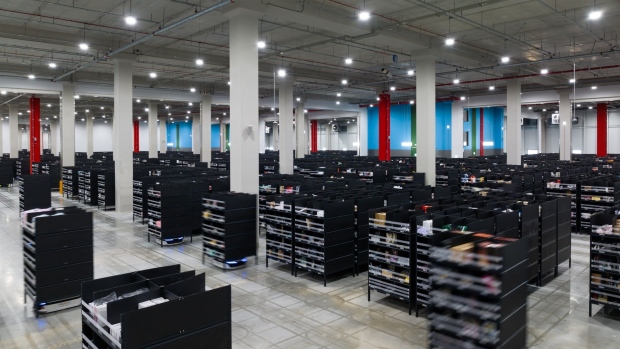Feb 6, 2023
Coupang Turns to Thousands of Robots in Bid for Profit
, Bloomberg News

(Bloomberg) -- Coupang Inc., the South Korean e-commerce pioneer that has lost billions of dollars since its founding, is rolling out an army of robots at fulfillment centers in a bid to reach profitability.
Korea’s answer to Amazon.com Inc., Coupang burned cash by building distribution centers around the country that could help it push the boundaries of speedy delivery with broad selection. Now the company is closing in on breaking even, with analysts projecting it will turn a profit for the second straight quarter and then report its first annual operating profit in 2023.
The extreme automation is on display one cold February day at a Coupang facility in the southern city of Daegu. Squat autonomously guided vehicles — AGVs for the robotically literate — march toward a collection point like school kids queuing for lunch. The machines, which can carry 1,000 kilograms, look like bookshelves riding on Roomba cleaners, delivering payloads to pickers and sorters. The workload for humans has been cut by about 65%.
Coupang has invested about $260 million in the 12-story fulfillment operation in Daegu, and it is revealing its humming, AI-directed nerve center for the first time. The typically low-profile company is going public because it plans to adopt this kind of automation in other facilities.
“There are more expansion plans,” E.J. Choi, regional director of fulfillment services, told Bloomberg TV at the Daegu fulfillment center. The new facility provides a model for improving the “effectiveness of how we operate to continue to deliver our customer service while we are reducing the intensity of our workers’ workloads.”
The Daegu facility is a dizzying effort to supplement human labor with artificial intelligence-powered machines. The AGVs are segregated in an enclosed area that stretches the length of the fulfillment center, presumably to avoid physical injury to workers. The robots race through their side of the enclosure, collect the ordered goods and zip over to a human laborer, who plucks the packages from the top of the robot.
On another floor, sorting robots organize goods based on Coupang’s algorithms to make them more efficient to collect. They dash across the plain white floor like rambunctious kids careening around an ice rink at full speed.
Coupang, like so many of today’s startups, grew up in an era when they could blow money by the billions because of backing from deep-pocketed investors like SoftBank Group Corp. But times have changed. The stocks of money-losing newbies have plummeted.
Fresh capital is almost impossible to come by. SoftBank’s Vision Fund cut back its new investments by about 95% in the most recent quarter.
Coupang has used its capital from private backers and a 2021 initial public offering to expand rapidly throughout South Korea. The number of customers continued to increase even through a recent price hike as the company pushed to deliver products faster and in a wider swath of regions.
Still, Coupang’s stock is off by more than half since its listing in New York in March 2021 at $35 a share. The company has been caught up in controversies in recent years with a fire accident at one of its fulfillment centers in Icheon in 2021, while staff continued to ask for better working conditions. It has pledged to secure safety at workplaces and started to offer health-care benefits to employees.
Read more: He Built an $8.9 Billion Fortune. Then Controversies Began
Under the guidance of Coupang founder Bom Kim, who has stepped down from his positions at a Korea subsidiary to lead overseas businesses, Coupang is pushing to expand new markets in Taiwan and Japan. “We’re excited about the long-term opportunity and markets beyond Korea,” said Kim on a call with investors in November. “When we do invest more, it’s a reflection of that confidence.”
Coupang has more than 100 fulfillment and logistics centers in South Korea, but has yet to build such automation-based facilities overseas and hasn’t given detailed expansion plans.
That could be the most challenging task for Coupang as it has to compete against big tech companies such as Amazon, said Shawn Yang, an analyst at Blue Lotus Capital Advisors.
“I think at least now it’s full of challenge because global expansion is not something very easy,” Yang told Bloomberg TV. Beyond the familiar huge internet retailers like Amazon and Alibaba, “there are some other players, like Shein, even TikTok wants to do its own e-commerce. So it’s going to be a very crowded business.”
Coupang is determined to keep rolling out the robots. The company sees Daegu as the beginning, not the end of its efforts.
“These are very modular and flexible systems,” said Choi. “We can easily replicate this in other locations.”
--With assistance from Adrian Wong, Andy Hung and Emily Yamamoto.
©2023 Bloomberg L.P.





